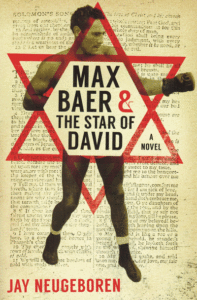Max Baer and the Star of David, by Jay Neugeboren, Mandel Vilar Press paperback, 206 pages, $19.95
Reviewed by NEAL GENDLER
In the anti-Semitic 1930s, the appearance of a large Jewish star on the trunks of powerful boxer Max Baer gave Jews a lift.
Baer “was a great warrior who represented and advanced the cause of the people of Israel at a time when they were subject to oppression, humiliation and the threat of annihilation,” says the novel’s fictional Howard Littlejohn Jr. in a foreword to this book supposedly dictated by his father.
Curly-haired and handsome, Baer defeated Nazi Germany’s Max Schmeling in June 1933, then punched his way to a world heavyweight title in 1934.
Jay Neugeboren’s engaging novel, Max Baer and the Star of David, is formed around Baer’s real life: his fights, fame, love of nightclubs and women (he was married briefly to actress Dorothy Dunbar and involved with Jean Harlow), showmanship, success in Hollywood films and dislike of training — blamed for his loss of title after 364 days.

While identifying as Jewish, by traditional measure he was not. Neugeboren and some sources say he was one quarter Jewish through a grandfather, although in a short biography on the Web site IMDb, Bill Takacs and Jon C. Hopwood say Baer had a non-practicing Jewish father and a Scots-Irish mother, and was raised Roman Catholic.
Neugeboren has Baer calling a boxer named Levinsky “a real, 100-percent Yid, not like me,” and saying of himself: “I’ve got a million-dollar body and a 10-cent brain.”
Neugeboren, who teaches at Columbia University and counts five prize-winning novels among 22 books, makes Baer’s story the setting for the more elaborate tale of Horace and Joleen Littlejohn, churchgoing African-American siblings living sinfully as husband and wife.
The Littlejohns are celebrating her 21st birthday in a restaurant when Baer passes by, recognizes Horace as a skilled sometime boxer and is smitten with the beautiful Joleen. Baer invites himself to sit down, soon hiring them as household help. He takes Horace on the road with him.
The three become intimates in every sense, with Baer fathering Joleen’s son, whom the Littlejohns raise as their own. Fictional Horace Jr. is born soon after (the real) Max Baer Jr. In the book, the sons grow up best friends and go on to worldly success, college funded by Baer. Horace Jr. becomes a scholar with two doctorates. The real Max Jr. graduated in business administration, took up acting and became known as Jethro Bodine in The Beverly Hillbillies, which crippled his career until his success writing and producing Macon County Line.
Neugeboren makes much of Baer’s actual genial nature and generosity. At his peak, Baer had the strongest right arm in boxing and in a 1930 bout killed Frankie Campbell. Ever remorseful, Baer raised money for Campbell’s children and paid their college tuition. Baer’s later beating of Ernie Schaaf was blamed for Shaaf’s death in a fight months later. Neugeboren writes that Baer may have lost several subsequent matches from reluctance to hit hard.
“The emergence of the potentially great boxer that lurked inside him essentially was denied by Baer’s overt persona, the good-natured clown,” Takacs and Hopwood say. Baer quit boxing in 1941. He died in 1959 at age 50.
I began Max Baer reluctantly, expecting to dislike it because I consider boxing barbaric and feel disgust that 21st-century people pay money to watch men (and now even women!) beat each other bloody and senseless.
I also have misgivings about novels developed around actual people or events, concerned that blending truth with imagination can muddy our knowledge.
Even so, the book is a winner, fascinating because of the author’s skill — forgiving a sentence of 182 words — in creating a near-spellbinding plot told with eloquence, only a fraction of which I have revealed. One of the charming devices is that eighth-grade educated Baer speaks trite, ungrammatical street English while the low-born, Bible-reading Littlejohns exhibit grammatical perfection and elegant elocution.
Max Baer also wins by illustrating the casual evil of segregation and the insistence of sexual desire, and by reawakening public knowledge of this colorful, once-prominent Jewish hero.
***
Neal Gendler is a Minneapolis writer and editor.
(American Jewish World, 3.11.16)



















